Whether you call it National Adoption Month or National Adoption Awareness Month, you may be surprised about facts surrounding its history and its intent.
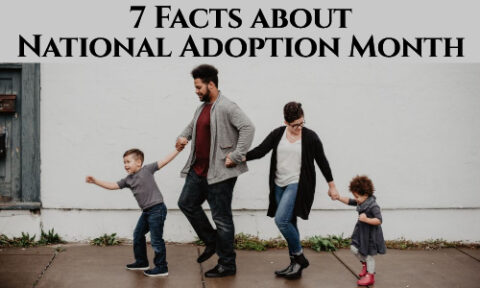
Here are 7 facts you may not know about National Adoption Month, sometimes also called National Adoption Awareness Month, which has its roots and branches in the month of November.
7 Facts You May Not Know about National Adoption Month
- The concept originated as Adoption Week in Massachusetts, set in 1976 by Governor Michael Dukakis to “promote awareness of the need for adoptive families for children in foster care.” — Child Welfare Information Gateway
- It became National Adoption Week in 1984, thanks to President Ronald Reagan. — Child Welfare Information Gateway
- It expanded to National Adoption Month in 1995, proclaimed by President Bill Clinton — The American Presidency Project
- In 2000, National Adoption Day was launched by a coalition of supporters, including the Dave Thomas Foundation for Adoption and The Alliance for Children’s Rights. — Wikipedia
- The original intent was to find families for children, not to find babies for families. Awareness is necessary for the 443,000 kids currently without permanent families, including 20,000 who are expected to age out each year never having a permanent family.
- Awareness is not as necessary for infant adoption, as the ratio of waiting-to-adopt parents to available newborns is estimated to be around 36:1. In other words, there is not a shortage of parents for newborns, but there is a shortage of parents for waiting children.
- Adoptees are not monolithically thrilled with all this promotion. Though President Donald Trump said in 2018 that Adoption is a blessing for all involved, many who live adoption – adoptees, birth parents, adoptive parents – recognize a deeper level of complexity. Stephanie Drenka reveals in her essay I’m Adopted, But I Won’t Be Celebrating National Adoption Month, a truth that goes alongside the blessings: Adoption is loss. She qualifies this statement with another: Please do not mistake my tone as anti-adoption.
What can we do with this information to better observe National Adoption Month?
As with so many complex matters, true understanding takes place beneath the level of a feel-good sound bite, which is almost always a fraction of the issue as a whole. Stephanie Drenka closes with a plea for non-adoptees to be open to better understand adoptees’ lived experiences, to listen more than to speak:
My call to action is not for the end of adoption. It is for a deeper understanding of its complexities, even the not-so-pleasant parts. There needs to be a centering of adoptee voices and value placed on their experiences. We must acknowledge their loss and develop trauma-informed support systems for them.
If you must do something to commemorate National Adoption Awareness Month, please honor the words of adoptees, starting with simply listening.
How do you plan to raise awareness for the children in your community who don’t have permanent families?
Along These Lines
- Adoptees’ #Flipthescript series
- AdoptLit section, which includes adoptee and birth parent narratives.
Lori Holden, mom of a young adult daughter and a young adult son, writes from Denver. She was honored as an Angel in Adoption® by the Congressional Coalition on Adoption Institute.
Her first book, The Open-Hearted Way to Open Adoption: Helping Your Child Grow Up Whole, makes a thoughtful anytime gift for the adoptive families in your life. Her second book, Standing Room Only: How to Be THAT Yoga Teacher is now available in paperback, and her third book, Adoption Unfiltered, is now available through your favorite bookseller!
Find Lori’s books on her Amazon Author page and catch episodes of Adoption: The Long View wherever you get your podcasts.

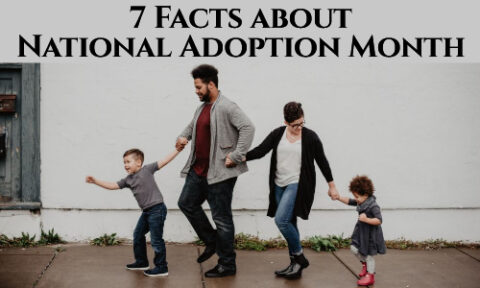
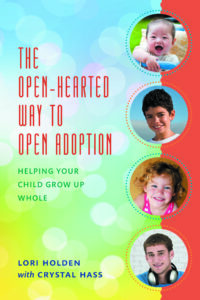
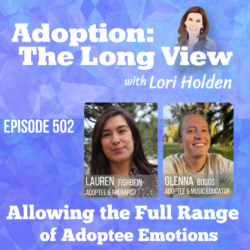
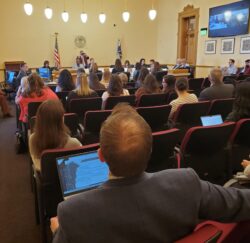
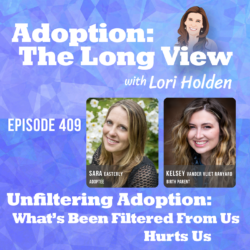

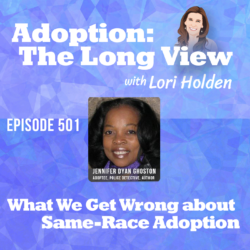

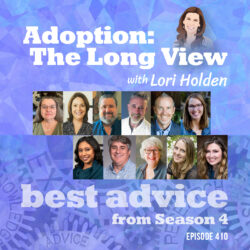
6 Responses
Such a fantastic post! I didn’t know any of it — how is started, the original intent, etc.
I love the original intent of finding families for children in foster care.
I hope that, with your help and greater education of the masses, people will begin to understand the complexities that surround adoption. It pains me when the concept is treated to glibly.
Wonderful post, Lori. You do such a fabulous job of spreading awareness. Thanks to you, and a UK friend who is both an adoption social worker and adoptive mum, I’ve become aware of many of these issues, but the sheer numbers in the US – of children waiting for permanent families, or becoming adults without ever having a permanent families – are heartbreaking.
Great article, Lori. I liked the last point most of all. I still don’t see as much of this (discussion and understanding of the complexities of adoption) as I think there needs to be. But thanks to you & people like you, the message is slowly getting out…! Thank you for all you do to build awareness!
Awesome article, Lori. You do such a great job of educating the public on the intricacies of adoption, and the fact that it isn’t monolithic, as you said. This year in my classroom I have a relatively large number of students who are either adopted from various processes or who are in that limbo of foster care with the hope of reuniting (but the situation is super sticky and so it’s possible that may not happen). Seeing the effects of the trauma firsthand is eye opening. Seeing the duality of happiness with biographical family paired with deep loss of biological family, that thin line of “adoption is great and I have a great family” paired with “adoption also caused a terrible wound that makes me feel abandoned inside and want to find as many connections with my biology as possible” — it’s really tough to see. That trauma informed lens is super important, whether you’re a parent or another adult with a role in a child’s life. I feel so grateful to have learned so much from you that helps me be a better guidepost for these kids. 🙂
I wrote same on November 1st!
https://onewomanschoice.wordpress.com/2020/11/01/national-adoption-month-2020/